INDIAN ARMED FORCES CHIEFS ON OUR RELENTLESS AND FOCUSED PUBLISHING EFFORTS

The insightful articles, inspiring narrations and analytical perspectives presented by the Editorial Team, establish an alluring connect with the reader. My compliments and best wishes to SP Guide Publications.

"Over the past 60 years, the growth of SP Guide Publications has mirrored the rising stature of Indian Navy. Its well-researched and informative magazines on Defence and Aerospace sector have served to shape an educated opinion of our military personnel, policy makers and the public alike. I wish SP's Publication team continued success, fair winds and following seas in all future endeavour!"

Since, its inception in 1964, SP Guide Publications has consistently demonstrated commitment to high-quality journalism in the aerospace and defence sectors, earning a well-deserved reputation as Asia's largest media house in this domain. I wish SP Guide Publications continued success in its pursuit of excellence.
- Prime Minister Modi Visits Punjab’s Adampur Air Base, Interacts with Airmen after Successful ‘Operation Sindoor’; Stern Message to Pakistan
- The layered Air Defence systems that worked superbly, the key element of Operation Sindoor
- Operation Sindoor | Day 2 DGMOs Briefing
- Operation Sindoor: India strikes back with Precision and Purpose
- Operation Sindoor: Resolute yet Restrained
- India’s Operation Sindoor Sends a Clear Message to Terror and the World – ‘ZERO TOLERANCE’
- Japan and India set forth a defence cooperation consultancy framework, talks on tank and jet engines
- Terrorist Attack in Pahalgam in Kashmir: Unfolding a long surgical war against PAK
- Lt General Pratik Sharma takes over Command of Indian Army's Northern Command
A 'Special status' and security: A resurgent era of Indo-German ties
According the "Special Status" in the conservative policy framework, German Chancellor Olaf Scholz, in his visit to India, opens a historic chapter in the Indo-German ties. The newly defined status surpasses the barriers beyond trade and commerce to defence and security with the potential to collaborate across the strategic and military domains from submarines to next-generation aircraft.
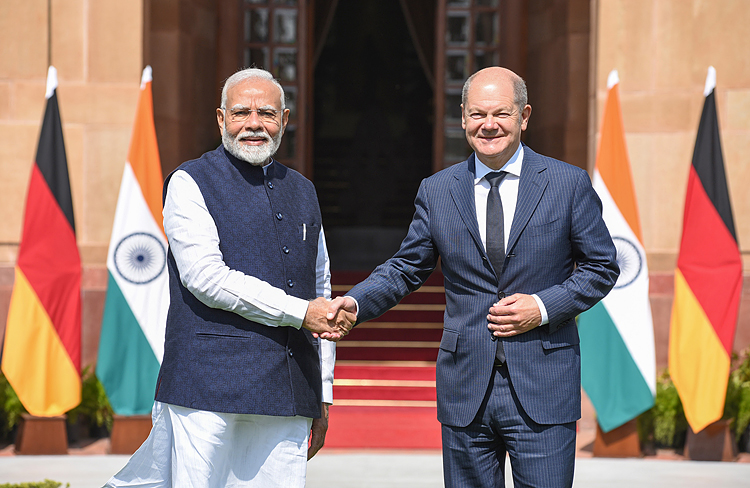
In such a "breakthrough bilateral talks" according to a senior German diplomat, all important issues were discussed, including the free trade with the European Union (EU). Olaf Scholz greatly endorsed a free trade agreement, and said, "it would benefit all sides".
Responding to the breakthrough ties, Prime Minister Narendra Modi highlighted the building of defence and security sectors with Germany, as a reflection of their strong mutual trust.
Germany's 'Focus on India Strategy' offers a comprehensive blueprint to modernise and elevate relations between two of the world's largest democracies
As the Prime Minister emphasised the ongoing joint initiatives in defence cooperation, such as the German Navy ship's port call in Goa, and said "Our partnership has gained new momentum and direction. Germany's 'Focus on India Strategy' offers a comprehensive blueprint to modernise and elevate relations between two of the world's largest democracies."
Just one week ahead of the annual intergovernmental consultations, the German government published its first strategic document solely focused on its engagement with India. The paper is the outcome of the government's long-standing deliberation as to how it wants to engage with India and prioritise its policies. The "Focus on India" is a comprehensive manual outlining Germany's planned approach towards India.
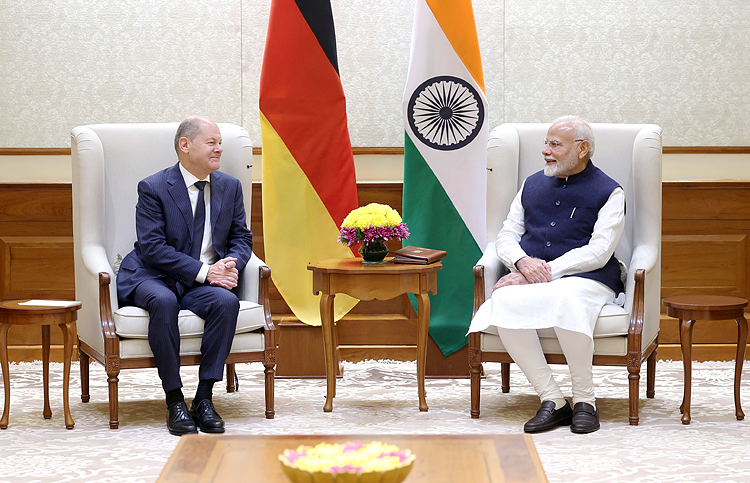
"We want to intensify our strategic partnership with India", is the message that cuts across Germany's new approach towards India which the government liberally outlines in his policy document.
Moreover, during Scholz's three-day visit to India, he also co-chaired the 7th Intergovernmental Consultations (IGC) after a gap of 12 years.
The significance is larger in terms of building a concrete outline for India as it was being seen as ambiguous at best, in the overall policy framework while the concern for China is also increasing within the German politico. Additionally, the historical reference towards India's freedom struggle is worth mentioning in analysing the resurgence of India-Germany ties. Germany is India's biggest trading partner within the EU, and Olaf is determined to strengthen strategic ties to counter China's growing influence on the West.
India – A democratic partner of Germany for stability and security
On October 16, 2024, the Cabinet adopted the key strategic document Focus on India. The vision document—Focus on India—attempts to redefine the strategic relations on the future actions within the Indo-Pacific realm, centred on India. Why so?
The centre of global growth lies at the heart of the Indian Ocean region (IOR). For Germany, it only connects Europe and Asia but opens a great deal towards the oil-rich Arab states. Today, the Indo-Pacific is home to 60 per cent of the world's economic output and two-thirds of global growth while more than 80 per cent of global trade is shipped by sea.
According to the document, the German Government wants to raise the strategic partnership that has underpinned their relationship with India since 2000 to a new level. The first steps towards implementation are to be agreed upon at the next Indo-German intergovernmental consultations at the end of the month.
Germany is India's biggest trading partner within the EU, and Chancellor Olaf Scholz is determined to strengthen strategic ties to counter China's growing influence
The paper sights the German's perspective and key role of India as a stabilising influence in a region where the global order based on the principles of the UN Charter and international law is facing considerable pressure. "The geopolitical lines of conflict in the Indo-Pacific and the high economic dynamics in the region will play a significant role in shaping the international order of the 21st century. In this process, India has expressed a clear aspiration to shape future developments and aspires also to promote the interests of developing countries throughout the world as "the voice of the Global South", the paper outlines and acknowledges the need to have greater alignment on issues.
A central component of this is intensifying security cooperation – both in the continuous efforts to find strategic convergence on key foreign and security policy challenges and through practical cooperation between the armed forces as well as reliable armaments cooperation.
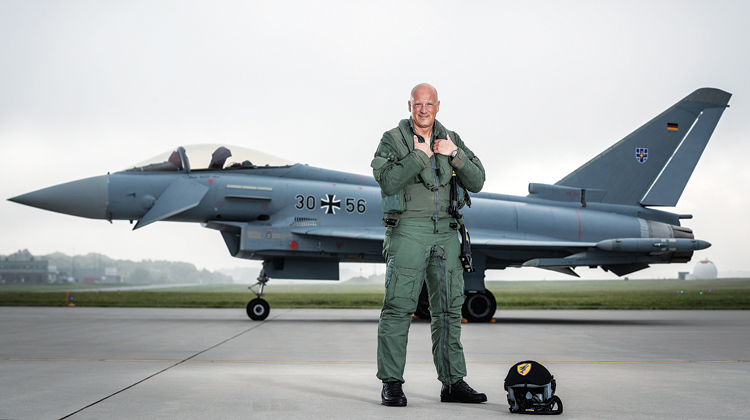
Germany and India are in the midst of a hi-stake submarine contract which also signifies the agreement and consensus on security. ThyssenKrupp Marine Systems, a leading German shipbuilder which supplies 70 per cent of non-nuclear submarines globally, has already joined hands with the Indian Defence Public Sector (DPSU), Mazagon Docks Ltd (MDL) for a $3 billion Project 75 (India) to build six conventional submarines with its advanced fuel-cell-based Air Independent Propulsion (AIP) technology.
Additionally, IAF is also scouting for a next-generation military transport aircraft, including the A400M to refuelers (A330 MRTT) which puts Germany at the heart of strategic collaboration with India.
The IAF is scouting for the Medium Transport Aircraft (MTA) for which A400M is in contention, along with the Brazilian C-390 Millennium and American C-130J.
Germany and India are advancing security cooperation, highlighted by a high-stakes submarine contract and potential collaboration on advanced military transport aircraft
This further opened the door for the German military entities, to look out for more opportunities in India, and to sustain their industry which is now being revived to achieve best-in-class tech in light of the Russia-Ukraine war.
However, the foundation was already laid for such strategic ties, as in August, during the multination military exercise 'Tarang Shakti' in India, the Chief of Luftwaffe (German Air Force) Lieutenant General Ingo Gerhartz in an interaction with the author in New Delhi, announced Germany's presence in the Indo-Pacific building a new era of military cooperation with India.
India-Germany has already inked a contract for the overhaul and refurbishment of the Indian submarine "INS Shankush" that India bought from Germany in the 1980s.

Several key agreements were signed following discussions between Scholz and Indian Prime Minister Narendra Modi, who highlighted the deepening ties between the two nations.
Crucially, the resurgence of the Asia-Pacific Conference of German Business is a significant development after a gap of 12 years.
"We have created a roadmap for India's development over the coming 25 years," announces the government.
It is important at such a critical time that the German Cabinet has released the "Focus on India" document which will eliminate the barriers in security cooperation which is so far confined to military-to-military exercise.
Chancellor Olaf further emphasied the strategic flashpoints in the region as the Indo-Pacific remains a region of concern due to maritime disputes and potential flashpoints, including the South and East China Seas. "We need to uphold international law and the principles of the UN Charter."
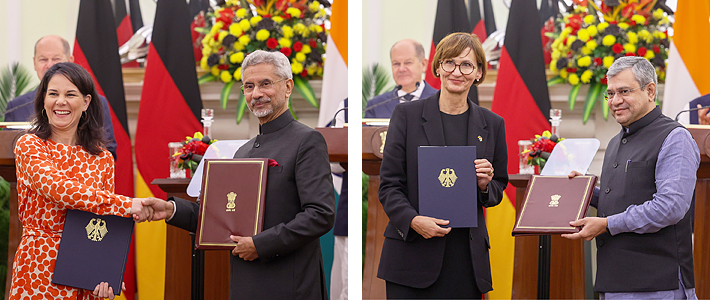
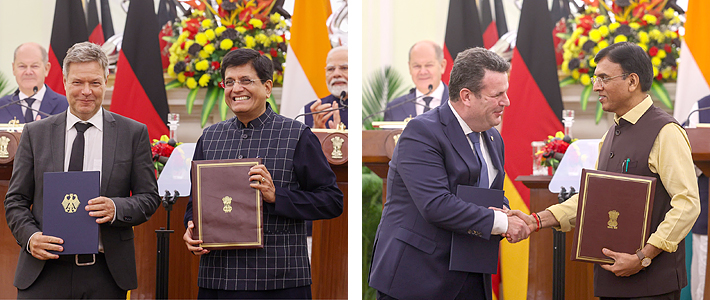
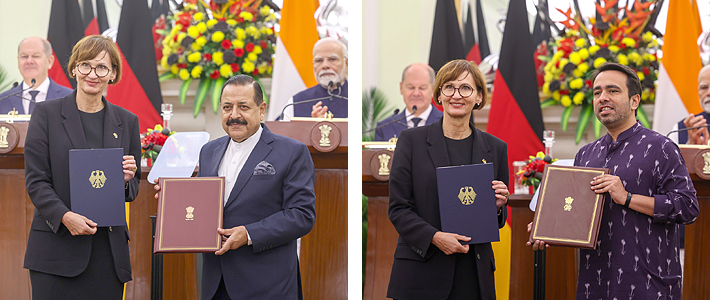
While India looked at it from the trade to technology perspective, Prime Minister Modi said, "India stands on four strong pillars: Democracy, Demography, Demand, and Data. Talent, technology, innovation, and infrastructure are the tools for India's growth. Today, an additional great force drives all of these: the strength of Aspirational India."
"That is, the combined power of AI — Artificial Intelligence and Aspirational India — is with us. Our youth are driving Aspirational India," he added.
On one hand, a CEO forum meeting is taking place, and on the other, both the navies are exercising together. German naval ships are currently on a port call in Goa. Additionally, the seventh Inter-Governmental Consultations (7th IGC) between India and Germany was co-chaired by PM Modi and Chancellor Olaf Scholz on October 25 in New Delhi. The high-level IGC included Ministers of Defence, External Affairs, Commerce & Industries, Labour & Employment, Science & Technology (MoS) and Skill Development (MoS) from the Indian side and Ministers of Economic Affairs & Climate Action, Foreign Affairs, Labour & Social Affairs and Education & Research from the German side along with Parliamentary State Secretaries for Finance. The talks touched up on technology and innovation, labour and talent, migration and mobility, climate action, green and sustainable development as well as economic, defence and strategic cooperation.
Mutual agreement
Agreement on the Exchange and Mutual Protection of Classified Information took place between Annalena Baerbock, Foreign Minister, and S. Jaishankar, External Affairs Minister. This signifies security cooperation as Germany gears up for the strategic alignment with India.
Further, both governments also inked the roadmap for the Indo-German Green Hydrogen with Robert Habeck, Minister of Economic Affairs and Climate Action with Piyush Goyal, Commerce & Industry Minister of India.
What signifies the visit is the Memorandum of Understanding on Cooperation in the field of Skill Development and Vocational Education and Training. Germany has decided to increase the number of visas for skilled Indians from 20,000 to 90,000 per year.
Such agreements indicate the beginning of a partnership with India in scale which will be crucial to the global realignment especially, the EU's role towards Asia and for India.
Manish Kumar Jha is a Consulting & Contributing Editor for SP's Aviation, SP's Land Forces and SP's Naval Forces and a security expert. He writes on national security, military technology, strategic affairs & policies.





